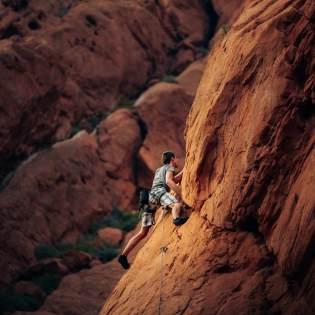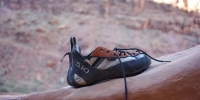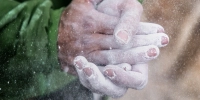Climbing Chalk: Dos & Don'ts For A Respectful Community

Climbing chalk is an indispensable tool for most climbers, significantly enhancing grip by absorbing sweat and moisture from hands. However, its widespread use comes with a responsibility to maintain a clean, respectful, and enjoyable environment for everyone. Good chalk etiquette is crucial, whether you're sending routes in a bustling indoor gym or tackling natural rock outdoors. This guide outlines the essential "dos" and "don'ts" of climbing chalk to ensure you contribute positively to the vibrant climbing community.
- Climbing Chalk Dos: Being A Responsible Climber
- Do Carry Your Own Chalk
- Do Use Chalk Responsibly
- Do Contain Chalk Dust
- Do Clean Up After Yourself
- Do Respect The Climbing Gym's Rules
- Climbing Chalk Don'ts: Habits To Avoid
- Don't Over-Chalk
- Don't Refrain From Chalking Holds Indiscriminately
- Don't Steer Clear Of Spreading Chalk Dust
- Don't Leave Chalk Bags Unattended
- Final Thoughts
- Frequently Asked Questions
- Do I Need A Chalk Bag For Climbing?
- Is There A Reason To Get Chalk Powder Instead Of Chalk Blocks?
- How Much Chalk Should Be In A Chalk Bag?
- Do You Need Chalk For Bouldering?
- Should I Wash My Chalk Bag?
- How Long Do Chalk Balls Last?
- Can I Refill A Chalk Ball?
- Does Chalk Dry Out Your Hands?
- Does Climbing Chalk Expire?
- Should You Put Chalk In Your Climbing Shoes?
- Why Is It Important To Carry Your Own Chalk?
- How Can I Use Chalk Responsibly To Avoid Negative Impacts?
- How Can I Contain Chalk Dust While Climbing?
- What Should I Do About Chalk Spills Or Excess Powder?
- Why Is It Important To Respect Climbing Gym Rules Regarding Chalk?
- Why Should I Avoid Over-chalking?
- Why Should I Refrain From Chalking Holds Indiscriminately?
- How Can I Avoid Spreading Chalk Dust?
- Why Shouldn't I Leave My Chalk Bag Unattended?
Climbing Chalk Dos: Being a Responsible Climber
Adhering to these practices will help maintain a clean environment and promote a positive experience for all.
Do Carry Your Own Chalk
Every climber should bring their own chalk bag. While borrowing chalk from others is generally fine in a pinch, relying on it regularly can become annoying for others. Moreover, many climbers are mindful of hygiene, especially concerning germs or open wounds on fingers. Having your own chalk bag ensures you're self-sufficient and considerate of others' personal space and health concerns.
Do Use Chalk Responsibly
Apply chalk sparingly to your hands before attempting a route. A light dusting is usually sufficient to absorb moisture and enhance grip. Excessive use leads to unnecessary residue buildup on holds and the surrounding areas, making them slippery for others and creating more mess. Find a balance that keeps your hands dry without over-chalking.
Do Contain Chalk Dust
When re-chalking or shaking off excess chalk, gently clap your hands together over your chalk bag. This simple action helps contain the majority of airborne dust particles, significantly reducing loose chalk in the air. Minimizing dust contributes to better air quality for everyone in indoor settings and less environmental impact outdoors.
Do Clean Up After Yourself
Be diligent about cleaning up any chalk spills or excess powder around your climbing area. Use a brush or a cloth to wipe off chalk residue from holds, crash pads, and the floor. This practice keeps the climbing space tidy and prevents chalk from accumulating on surfaces where it can reduce friction or just look unsightly.
Do Respect the Climbing Gym's Rules
Familiarize yourself with specific regulations regarding chalk usage in indoor gyms. Some gyms may restrict loose chalk, preferring chalk balls or liquid chalk to maintain air quality and cleanliness. Adhering to these guidelines shows respect for the gym's management, staff, and fellow climbers, contributing to a pleasant and healthy climbing environment for all.
Climbing Chalk Don'ts: Habits to Avoid
These actions can negatively impact the climbing experience for yourself and others.
Don't Over-Chalk
Avoid the habit of repeatedly dipping your hands into your chalk bag and creating large clouds of dust. Over-chalking is wasteful and unnecessary. It leads to excess chalk coating holds, which can actually make them more slippery over time, and it pollutes the air for everyone else.
Don't Refrain From Chalking Holds Indiscriminately
Only chalk holds that genuinely feel slippery or insecure. Coating holds with chalk when they don't require it contributes to unnecessary buildup and can leave permanent white marks on outdoor rock. Learn to distinguish when chalk is truly needed versus when it's just a habit.
Don't Steer Clear of Spreading Chalk Dust
Be mindful of others around you. Avoid excessive hand-clapping or shaking of chalked hands, especially when near other climbers, their gear, or food. Dispersing chalk particles into the air can be irritating for those with respiratory sensitivities and creates an uncomfortable environment.
Don't Leave Chalk Bags Unattended
When you take a break or finish your session, always keep your chalk bag with you or securely put away. Leaving it open and unattended on the floor can easily lead to accidental spills, especially in busy gyms, creating a mess for staff and other climbers to deal with.
Final Thoughts
Climbing chalk is a privilege, not a right. By understanding and practicing proper chalk etiquette, you contribute to a positive, respectful, and sustainable climbing environment. Responsible chalk usage not only benefits your own climbing but also enhances the experience for every member of the climbing community, both indoors and out. Let's all do our part to keep our climbing spaces clean and enjoyable for generations to come.
Frequently Asked Questions
Do I need a chalk bag for climbing?
While not strictly essential for every climb, a chalk bag is highly recommended if you plan to use climbing chalk. It provides a convenient, contained way to carry and access chalk, improving efficiency and preventing spills, especially on holds that are often touched or when your palms sweat.
Is there a reason to get chalk powder instead of chalk blocks?
The choice between chalk powder and chalk blocks is largely personal. Some climbers prefer powder for its convenience and quick, even hand coverage, while others prefer blocks for their texture and less airborne dust. Both effectively absorb moisture to improve grip.
How much chalk should be in a chalk bag?
The ideal amount of chalk in a bag is a personal preference, but generally, you want enough to easily coat your hands without having to dig, but not so much that it spills easily. Many climbers keep 1-2 broken-down chalk blocks' worth in a bucket-style bag. The goal is just enough to keep hands dry and improve friction.
Do you need chalk for bouldering?
Chalk is not strictly required for bouldering, but it is very commonly used. Many boulderers find it helps significantly by absorbing sweat and enhancing friction, providing a more secure grip, especially on challenging or polished holds. It's a personal preference that often improves performance.
Should I wash my chalk bag?
Generally, you don't need to wash your chalk bag frequently. It's primarily for containing chalk. You might consider washing it if it becomes visibly dirty, starts to smell unpleasant due to accumulated sweat and grime, or if you want to switch chalk types and remove residue.
How long do chalk balls last?
The longevity of a chalk ball varies significantly based on how often you climb and your personal chalk usage habits. Typically, a single chalk ball can last anywhere from several months to a year or more for a regular climber, depending on its size and your specific usage.
Can I refill a chalk ball?
Yes, most chalk balls are designed to be reusable and refillable. They usually have an opening that allows you to add loose chalk once the existing chalk is depleted. This is an economical and environmentally friendly practice, reducing waste.
Does chalk dry out your hands?
Yes, climbing chalk (magnesium carbonate) is designed specifically to absorb moisture and sweat from your hands. This drying effect is crucial for improving friction between your skin and the climbing holds, which helps prevent slipping and enhances your grip strength during a climb.
Does climbing chalk expire?
No, climbing chalk does not have an expiration date in the traditional sense. It is a stable mineral (magnesium carbonate) that does not degrade or spoil over time. As long as it is kept dry and away from moisture, it will remain effective indefinitely.
Should you put chalk in your climbing shoes?
Yes, putting a small amount of chalk in your climbing shoes can be beneficial. It helps absorb moisture from your feet, which can reduce odor and make the inside of the shoes feel softer and more comfortable. It can also help with moisture management inside the shoe during climbs.
Why is it important to carry your own chalk?
Carrying your own chalk is important for hygiene reasons, as it avoids sharing germs, especially if climbers have cuts or scrapes. It also ensures you always have the chalk you prefer and aren't relying on others, which promotes self-sufficiency and courtesy within the climbing community.
How can I use chalk responsibly to avoid negative impacts?
Use chalk responsibly by applying it sparingly and only when necessary. Avoid excessive dusting, which creates airborne particles and coats holds unnecessarily. A light coat is often all that's needed to manage sweat and improve grip, minimizing mess and impact on others.
How can I contain chalk dust while climbing?
To contain chalk dust, always clap your hands together gently over your chalk bag when re-chalking. This simple action significantly reduces the amount of chalk released into the air, contributing to cleaner air in gyms and less environmental impact outdoors.
What should I do about chalk spills or excess powder?
It's important to clean up any chalk spills or excess powder promptly. Use a brush or a cloth to wipe down any affected areas on the floor, crash pads, or holds. This practice helps maintain cleanliness and prevents chalk from accumulating, which can make surfaces slippery.
Why is it important to respect climbing gym rules regarding chalk?
Respecting climbing gym rules regarding chalk, such as using chalk balls or liquid chalk instead of loose chalk, helps maintain air quality and cleanliness within the facility. Adhering to these guidelines shows consideration for gym staff and fellow climbers, contributing to a more pleasant environment.
Why should I avoid over-chalking?
Over-chalking leads to excessive chalk dust in the air and visible white residue on holds and equipment, making them slippery for others. It's wasteful and can detract from the climbing experience for everyone. A light, effective application is always preferable.
Why should I refrain from chalking holds indiscriminately?
Chalking holds indiscriminately means applying chalk to holds that don't need it. This creates unnecessary buildup, which can make holds slick, obscures the natural rock features, and leaves unsightly marks, especially on outdoor rock. Only chalk holds that are genuinely slippery or require a better grip.
How can I avoid spreading chalk dust?
To avoid spreading chalk dust, be mindful of your actions. Avoid vigorous hand-clapping or shaking of chalked hands in proximity to others, their gear, or food. Minimizing dust dispersal ensures a cleaner and more comfortable environment for everyone in the climbing area.
Why shouldn't I leave my chalk bag unattended?
Leaving your chalk bag open and unattended, especially in a busy climbing gym, increases the risk of accidental spills. This creates a mess that others might have to clean up and can be an inconvenience for the gym staff. Always keep your chalk bag secure or with you.













